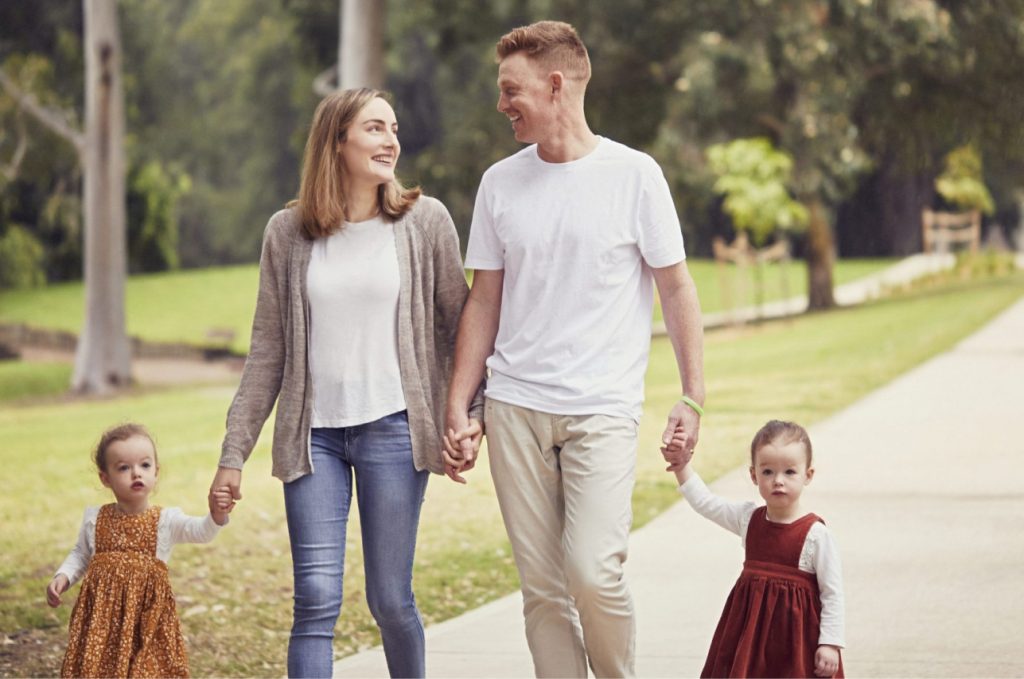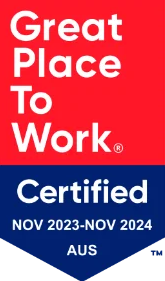At FDC, the safety and wellbeing of our people is at the centre of everything we do. It is part of who we are, how we work, and how we succeed.
We understand that safety is not just a checklist, it is creating safe environments, practices, and providing the support that teams and individuals need.
We are invested in our people both on and off the job, and our commitment doesn’t just stop at the end of the work day.
It’s safety and wellbeing, made personal.
Safety at work, starts with a safe workplace, on and off-site. Defining processes and providing WH&S infrastructure that are both a preventative measure and a commitment to the ongoing safety of our people.
We are stronger together, and we support one another. Teamwork and collaboration is at the core of everything we do and that includes safety and wellbeing. We keep our environment and people safer by working collectively.
We take a personal approach to individual wellbeing. We know that one size doesn’t fit all and that everyone’s needs are unique. This includes fostering environments where people are comfortable asking for help, and seek the support they need.
Providing the right resources at the right time. Timing is everything, and our information and resources are readily available for our people without friction or barriers, when it is needed most.
Safety and wellbeing is always part of the conversation. An on-going commitment to advocacy and raising awareness, that furthers our reach and sees lasting positive impact throughout our organisation and industry.
Join Mick Dalby and Chris Bignell as they explain Work Safe. Live Well.
If you need immediate assistance call 000 or to speak to someone urgently, please call Lifeline on 13 11 14 or Suicide Call Back Service on 1300 659 467.
Counselling support for on-site staff is available via the Employee Assistance Program (EAP) on 1300 762 989, or Foundo Blue on 1300 403 403.
R U OK? is calling on all Australians all year round to let the people you care about know you’re here to really hear them. By taking the time to start a conversation and genuinely listen we can all help the people around us feel supported and connected.
Let the people in your world know you’re here, to really hear, because a conversation could change a life.
It takes strength to be vulnerable, and having someone to talk to can be the difference between succumbing and surviving. You don’t have to be an expert to reach out – just ask, “R U OK?” and listen closely to the answer. If inspiring a conversation or forging a connection can save even one life, it will have been worth it.
Everyday is R U OK? Day.
Need a few pointers? These four steps will help you to have a conversation that could be a life-saver.
When FDC Site Manager, Ben Woods lost his brother Jase to suicide, he embarked on a journey that would not only celebrate his brother’s life, but help save others, too.
Jase and I were two-and-a-half-years-apart, but we were the best of mates. We grew up in a town called Sawtell, just south of Coffs Harbour on the north coast of New South Wales. It was a typical upbringing and we spent all of our time in each other’s pockets.
Whatever sport was on the TV, we were playing that in the backyard. Jase was a jovial guy. He made everyone laugh when they walked into a room. He was always smiling.
He was popular at school, and an amazing sportsman. We got along like a house on fire. I made the big trip down to Sydney when I was 18 and became a carpenter. As soon as Jase finished school he followed suit and became a carpenter too. We lived together in Sydney and shared a car driving to work. There was little time spent not living under the same roof.
My brother went through depression in his early 20s, but he saw someone about it, and he dealt with it by playing sports and getting lots of exercise. He was a carpenter by trade so he was always very physical that way. He seemed to get through it, but it came on again in his late 20s. In the six months leading up to Jase’s passing, my mum and I saw what he went through. His suffering was immense and he was in and out of hospital. I would always say to him that, “I will never, ever give up on you.”
MAKING SENSE OF GRIEF
When Jase took his life, it was a massive shock. It was absolutely devastating – not only because he was no longer here, but because he couldn’t live the life he should have.
It was 3 months before my wedding to Kat and Jase was to be my best man.
I heard a good saying which is that ‘grief is love with nowhere to go’ and it was evident at Jase’s funeral. I could see all the people there with so much love to give to someone that they didn’t even know was suffering. I wanted to take the love that everyone had for him and turn it into something meaningful; to keep Jase alive in spirit.
I often spoke to Jase when he was suffering, about traveling around Australia. When we got my brother’s ashes, I decided that riding my bike around Australia and raising awareness for mental health was a good way to remember him. It was cathartic for me, to have time alone with him, raise money for The Black Dog Institute and spread the message to those who were still here and suffering. If cycling around Australia, spreading awareness and lowering the stigma of mental illness could save even one life, it would be worth it. That person could have been Jase.
CONNECTION IS EVERYTHING
Some of the most profound memories of the ride were due to the people I met along the way. I felt so proud of those who approached me to share their experiences. There was one day in particular – we were riding up to Cape York. I had a two-way radio that was on channel 40, which is one that the truck drivers used. I used it to communicate with my wife, Kat, who was in the camper van driving around Australia as my support team along side my mother following close behind in a caravan.
None of the truck drivers realised that I could listen in to all their conversations. They were saying, “What an idiot. What’s he doing on the road?” One of them said, “Well, this guy’s different.” That stuck with me, because I thought if I want to raise awareness and money, I have to be different. I spoke to him and he was taken aback that I’d heard him, but we started a conversation. In a matter of minutes, we were talking about how he lost his daughter to suicide. He said that he’d never talked to his mates about it. There were a few truck drivers like that, who talked to me about things they hadn’t told anyone before.
Towards the end of the ride, on the Nullarbor, we found out that Kat was pregnant. When we finally rode into Manly – after 20,000 kilometres, achieving a Guinness World Record for “The longest distance by bicycle in a single country” and having raised $386,217 for The Black Dog Institute – we didn’t tell anyone the news. Two days later, we discovered we were pregnant with twin girls. I want my daughters to always feel comfortable talking about their feelings. Sometimes I feel like our twins were a gift from my brother, because they are mates, they’ve got each other for life. It’s pretty special.
LEAN ON YOUR MATES
My brother and I were both in construction, so when I got back from the ride, I started to look into the statistics. Construction workers are more than twice as likely to suicide than others in general, and six times more likely to die from suicide than from a workplace accident. You’ve got men in a male-dominated environment, who aren’t always good at dealing with their feelings. The stigma is quite bad.
For R U OK? Day this year, we’re flying the flag for Mates in Construction. It’s a not-for-profit organisation that provides free suicide first aid courses, to people in construction. They want to get as many people in construction, mining and energy to do this course so they can look out for each other.
For men in particular – having a mate who can pick you up when you’ve gone off the rails, is massive. It’s hard to bring yourself out of that when you’re under those dark clouds, battling with your demons and suffering from the black dog.
KNOW YOU’RE NOT ALONE
Everyone goes through anxious or depressing times in their life, but so many of us are battling by ourselves. If there’s more awareness out there, we can understand it better. I’m a strong believer that mental health awareness should start in schools. Kids need to be taught that in life you will face adversity, that it’s okay to face adversity and that it may cause serious mental challenges that you will need to overcome.
When starting conversations about mental health, creating a safe space that allows people to feel comfortable about opening up is crucial. On the ride, it was easy, because I wore my intention on my sleeve. It was all about spreading the word and it started with being vulnerable. Don’t be afraid to tell people about yourself. Maybe you’ve struggled in your life or there were times when you’ve had difficulties. That might help someone else to relate to your story or dive into what it is they’re battling with themselves.
The key is to listen very, very well when they do talk back. The truth is, everyone’s the same: we all want human connection. Everyone wants to be loved and to be heard. That’s all we want. If we can do that for each other, the world’s a better place for everyone.

Have a great resource you want to share with our teams or a suggestion to improve the way we can work together to live well? We would love to hear from you. Please send us an email.

22-24 Junction Street,
Forest Lodge NSW 2037
(02) 8117 5000
Australian Offices
| Sydney | (02) 8117 5000 |
| Adelaide | (08) 8425 8600 |
| Brisbane | (07) 3230 8700 |
| Canberra | (02) 6222 8800 |
| Melbourne | (03) 9254 0000 |
| Perth | (08) 6165 5800 |
